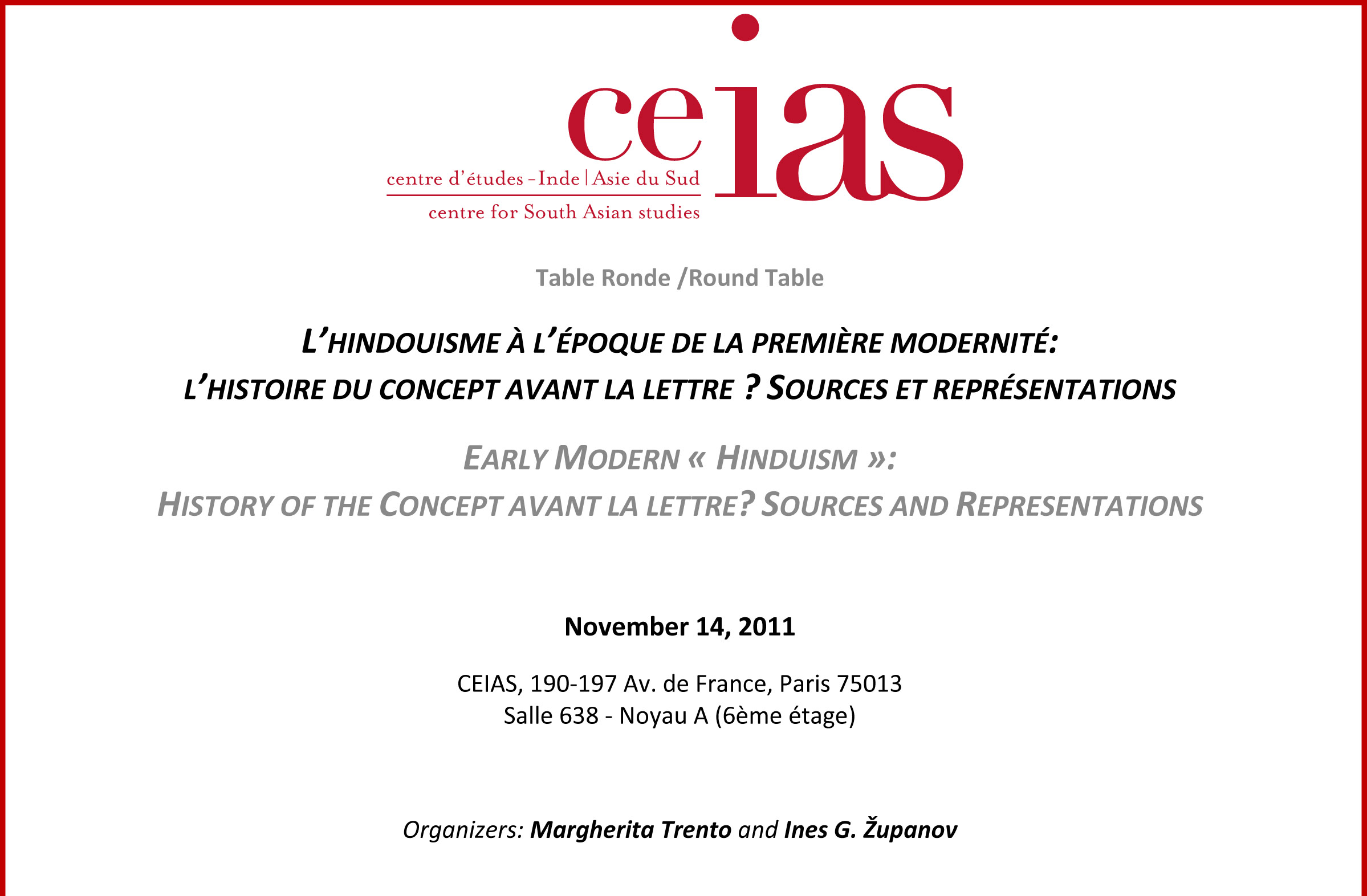Vie scientifique | Journées d'études
L’hindouisme à l’époque de la première modernité : l’histoire du concept avant la lettre ?
Sources et représentations
Organizers: Margherita Trento and Ines G. Županov
In a recent scholarly production on Hinduism, the role of Western representations and the history of its name have been discussed wide and large. European orientalist and missionary representations were decisive in inventing the concept in the early 19th century, which homogenized a loosely knit tradition (from various hermeneutical and ideological positions to ritual practices) into a tightly packed geo-cultural whole. During the 20th century, Hinduism was finally recognized as a “world religion”.
The goal of our round table is to look specifically into early modern genealogy of the concept, especially, though not exclusively, from Catholic missionary sources (Italian, Spanish, Portuguese, Latin, French but also Sanskrit, Tamil and Marathi), while avoiding essentializing, anachronism and teleology still present in historiography and in religious studies when dealing with Hinduism. Against facile claims that the British invented “everything” and against Sir William Jones’s invitation to forget “everything that we knew about India before”, in this workshop we want to show that knowledge, connected with another empire and diverse colonial actors, was produced and responsible for conceptualizations such as, for example, the term Brahmanism (bramanismo) invented in 1616 by a Jesuit in Madurai and used a few years later as a “machine of Brahmanism” by another Jesuit in Kerala. The new research has shown that the Brahman converts in Madurai, Goa and elsewhere have to a large degree defined the early Jesuit and Portuguese “orientalist” conceptions and the question is can we - should we and how – disentangle Indian and European voices in the process of constructing Hinduism. Another question is how to chart the itineraries of these early Catholic orientalist representations though the 18th century (Enlightenment and “revolutions”) into the 19th century in which Indology and Orientalist studies came of age.
During the half a day of round table discussions and presentations, the goal of this meeting is to share the most recent work (since most of the participants have just completed the PhD or are still writing their doctoral dissertations) on the topic from a variety or archival sources such as Jesuit records, the archives of the Propaganda Fide, the Inquisition in Rome and Goa, French archives, etc.
We would like to stress that our primary goal is to provide a platform for a cross-disciplinary dialogue. For this reason, the presentations will be no longer than seven minutes followed by fifteen minutes of discussion for each session, and we’ll have about an hour for the general discussion at the end of the conference.
Document(s) à télécharger
Les sites du CEIAS
- SAMAJ | The South Asia Multidisciplinary Academic Journal
- CEIAS - Facebook
- CEIAS - Twitter
- CEIAS - Newsletter
- Le Bulletin de la Bibliothèque
- Régionalisme & cosmopolitisme
- DELI | Dictionnaire Encyclopédique des Littératures de l’Inde
- DHARMA | The Domestication of “Hindu” Asceticism and the Religious Making of South and Southeast Asia
- TST | Texts Surrounding Texts
- STARS | Studies in Tamil Studio Archives and Society 1880-1980
- I-SHARE | The Indian Subcontinent’s Shared Sacred Sites
- Sri Lanka et diasporas
- Sindhi Studies Group
- Carnet du Master Études asiatiques
- Master “Asian Studies”
- Social Sciences Winter School in Pondicherry
- Caste, Land and Custom
- Musiques indiennes en terres créoles
 Actualités
Actualités
Devenir juifs : conversions et assertions identitaires en Inde et au Pakistan
 Débat - Mardi 9 mai 2023 - 14:00Présentation« L’an prochain à Jérusalem ! », scande un homme portant une kippa dans une synagogue de Karachi au Pakistan. Ses paroles sont répétées en chœur par les membres de sa communauté, un groupe comptant près de trois cents personnes qui s’autodésignent par (...)(...)
Débat - Mardi 9 mai 2023 - 14:00Présentation« L’an prochain à Jérusalem ! », scande un homme portant une kippa dans une synagogue de Karachi au Pakistan. Ses paroles sont répétées en chœur par les membres de sa communauté, un groupe comptant près de trois cents personnes qui s’autodésignent par (...)(...)
Le Centre d'études sud-asiatiques et himalayennes (Cesah), nouveau laboratoire de recherche (EHESS/CNRS) sur le Campus Condorcet
Échos de la recherche -Depuis le 1er janvier 2023, l'EHESS, en tant que co-tutelle, compte un nouveau centre de recherche né de la fusion du Centre d'études de l'Inde et de l'Asie du Sud (CEIAS - EHESS/CNRS) et du Centre d’études himalayennes (CEH - CNRS) : le Centre d'études sud-asiatiques et h (...)(...)
Centre d'Études de l'Inde et de l'Asie du Sud
UMR8564 - CNRS / EHESS
54 boulevard Raspail
75006 Paris, France
Tél. : +33 (0)1 49 54 83 94
Communication :
nadia.guerguadj[at]ehess.fr
Direction :
dir.ceias[at]ehess.fr
La bibliothèque du CEIAS
Maison de l'Asie
22 avenue du Président Wilson 75016 Paris
54 boulevard Raspail
purushartha[at]ehess.fr



